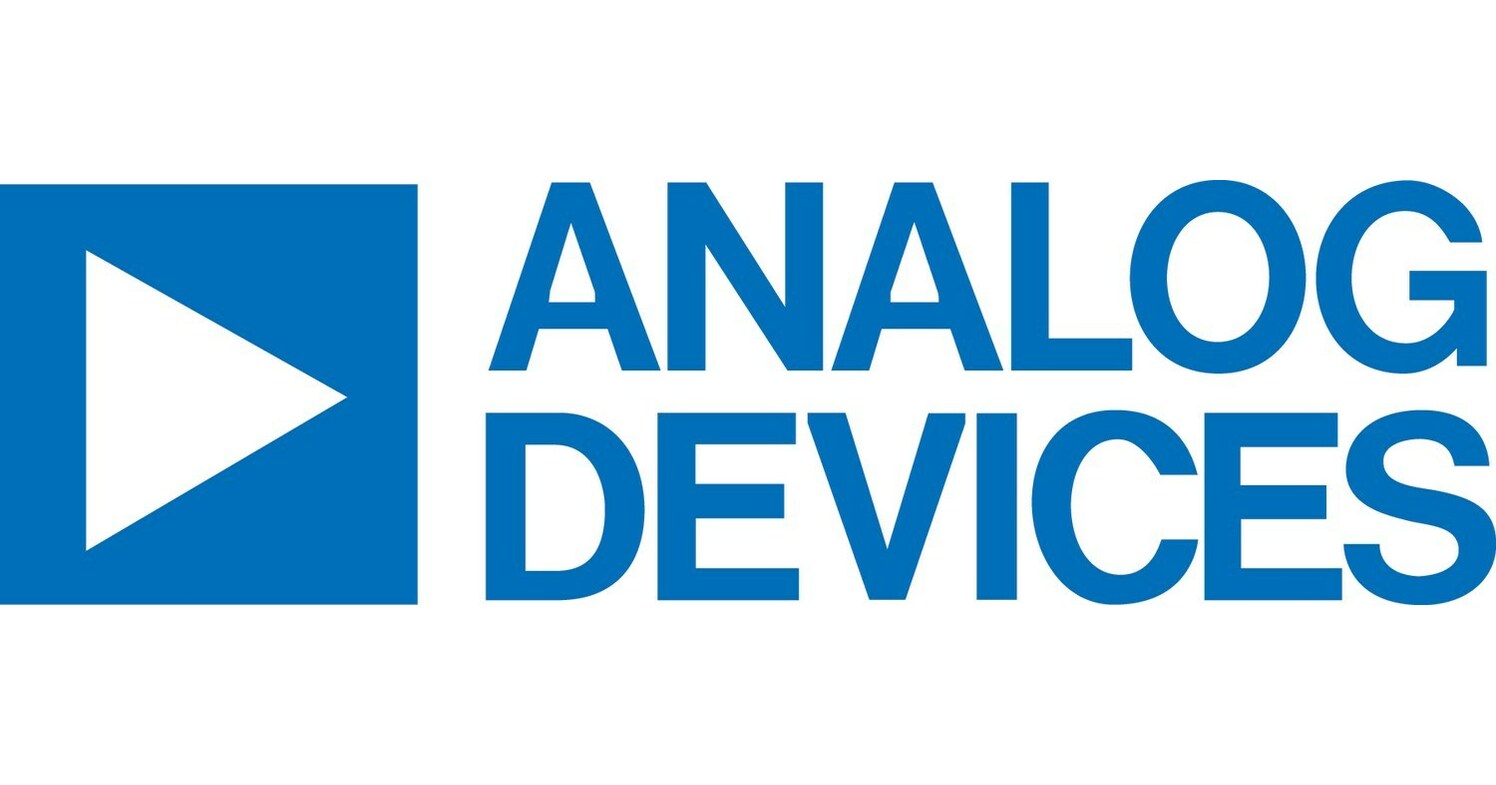Analog Devices Shares Surge 7% on Q1 Beat & Strong Guidance

Analog Devices (NASDAQ:ADI) shares gained more than 7% on Wednesday after the company reported its Q1 results, with EPS of $2.75 coming in better than the Street estimate of $2.61. Revenue of $3.25 billion beat the Street estimate of $3.15 billion.
While lead times have shortened for much of the portfolio and longer-term cancellations have risen, the company cited still-strong demand in its core end markets of Industrial and Automotive and resumed its more bullish tone that it adopted on its November earnings call.
For Q2, the company expects EPS in the range of $2.65-$2.85, compared to the Street estimate of $2.42. Q2 revenue is seen at $3.1-3.3 billion, beating the Street estimate of $3.03 billion, once again bucking the trend of its competitors which almost universally guided below Street expectations this earnings season.
| Symbol | Price | %chg |
|---|---|---|
| AMD.BA | 34160 | 0.12 |
| 000660.KS | 580000 | 0 |
| LRCX.BA | 4172.5 | 0 |
| TXN.BA | 46880 | -0.43 |

Analog Devices, Inc. (NASDAQ:ADI) Quarterly Earnings Preview
- Earnings Per Share (EPS) is expected to be $1.93, marking a 22.2% increase year-over-year.
- Projected revenue of approximately $2.76 billion, a 19.2% increase from the previous year.
- ADI has a history of surpassing the Zacks Consensus Estimate, with an average earnings surprise of 5.6%.
Analog Devices, Inc. (NASDAQ:ADI) is a leading player in the semiconductor industry, known for its innovative solutions in sectors like AI infrastructure, electric vehicles, and industrial automation. As a diversified semiconductor producer, ADI is set to release its quarterly earnings on August 20, 2025. Wall Street anticipates earnings per share (EPS) of $1.93 and revenue of approximately $2.76 billion.
The expected EPS of $1.93 represents a significant 22.2% increase from the same period last year. This growth is driven by strong demand in key sectors such as industrial automation and healthcare. The revenue projection of $2.76 billion marks a 19.2% year-over-year increase, aligning closely with the Zacks Consensus Estimate. This stability in earnings projections is crucial as it can influence investor reactions to the stock.
ADI's lean inventories and stronger bookings are expected to support its quarterly growth. The company has consistently surpassed the Zacks Consensus Estimate in the last four quarters, with an average earnings surprise of 5.6%. This track record of exceeding expectations may positively impact investor sentiment and stock performance.
Despite the positive earnings outlook, historical data suggests that ADI's stock has shown a tendency to perform negatively following earnings announcements. Over the past five years, a positive one-day return occurred in only 47% of cases. This pattern highlights the importance of managing investor expectations and market reactions.
Financially, ADI maintains a strong position with a price-to-earnings (P/E) ratio of approximately 62.73, reflecting high market expectations for future earnings growth. The company's debt-to-equity ratio of 0.21 indicates a relatively low level of debt compared to equity, while a current ratio of 2.08 suggests good short-term financial health. These metrics underscore ADI's solid financial foundation as it navigates the competitive semiconductor landscape.

Analog Devices Reports Q2 Beat and Bullish Guidance, But Stock Falls 3%
Analog Devices (NASDAQ:ADI) delivered better-than-expected Q2 2025 results and issued an upbeat forecast for the current quarter, fueled by strong demand across all key markets. However, shares fell over 3% intra-day today following the report.
The semiconductor company reported adjusted EPS of $1.85, topping the $1.70 consensus. Revenue came in at $2.64 billion, beating estimates of $2.51 billion and marking a robust 22% year-over-year increase. Growth was broad-based, with all end markets showing double-digit gains, signaling a solid rebound across the cyclical semiconductor landscape.
CEO Vincent Roche emphasized the company’s resilience in the face of ongoing global trade uncertainties, pointing to ADI’s diversified portfolio and operational execution.
Looking ahead, ADI expects Q3 revenue between $2.65 billion and $2.85 billion, with the midpoint ($2.75 billion) above the $2.62 billion consensus. The company also guided for adjusted EPS of $1.82 to $2.02, comfortably bracketing and exceeding the Street's $1.82 estimate at the high end.

Analog Devices, Inc. (NASDAQ:ADI) Overview and Analyst Insights
- The consensus price target for ADI has been adjusted from $245.37 to $214, with Morgan Stanley setting a more conservative target at $178.
- ADI's share price has seen a 4.1% increase, buoyed by positive earnings estimate revisions and anticipation of a 16% revenue increase in the upcoming Q2 FY'25 earnings report.
- Despite a 23% revenue decline forecasted in 2024, ADI's strategic investments and diversified market presence position it for a strong recovery in 2025.
Analog Devices, Inc. (NASDAQ:ADI) is a key player in the semiconductor industry, specializing in the design and production of integrated circuits and related technologies. The company serves a wide array of markets, including industrial, automotive, and telecommunications, with a strong global presence. ADI's competitors include companies like Texas Instruments and NXP Semiconductors.
The consensus price target for ADI has decreased from $245.37 a year ago to $214 in recent months. This decline suggests a more cautious outlook from analysts. Despite this, Morgan Stanley has set a lower price target of $178, reflecting a conservative stance amidst market volatility and geopolitical factors, such as tariffs affecting semiconductor stocks.
Market conditions, including interest rates and inflation, play a significant role in shaping analyst expectations. ADI's recent 4.1% share price increase, supported by positive earnings estimate revisions, indicates potential resilience. Analysts are closely watching ADI's upcoming Q2 FY'25 earnings report, with expected revenues of $2.51 billion, a 16% increase from the previous year.
Company performance is crucial in determining price targets. ADI's strategic focus on mergers, acquisitions, and U.S. manufacturing investments aims to counter global supply chain disruptions. Despite a 23% revenue decline in 2024, ADI remains committed to research and development, returning $2.4 billion to shareholders, and anticipating a strong recovery in 2025.
Industry trends, such as technological advancements and demand changes, also impact ADI's outlook. The semiconductor sector faces challenges from tariffs and market volatility, but ADI's balanced business model and diversified market presence provide a solid foundation for future growth. Investors should monitor these factors and ADI's earnings reports for further insights.

Analog Devices Shares Jump 6% on Q1 Beat and Strong Outlook
Analog Devices (NASDAQ:ADI) saw its shares surge over 6% intra-day today after delivering better-than-expected first-quarter earnings and issuing an optimistic outlook for the second quarter.
For Q1, the semiconductor company posted earnings per share of $1.63, surpassing analyst expectations of $1.54. Revenue fell 4% year-over-year to $2.42 billion, but still came in ahead of the $2.36 billion consensus forecast.
Margins also exceeded estimates, with an adjusted gross margin of 68.8%, compared to the 67.8% projection, while its adjusted operating margin reached 40.5%, slightly above the expected 40.2%.
Management highlighted an improving demand cycle and strong execution across key business segments, positioning Analog Devices for a gradual recovery despite macroeconomic and geopolitical challenges.
For Q2 2025, the company forecasts earnings per share of $1.68, plus or minus $0.10, slightly exceeding the $1.66 analyst consensus. Revenue guidance of $2.5 billion, plus or minus $100 million, also landed above the $2.457 billion Wall Street estimate.

Analog Devices, Inc. (NASDAQ: ADI) Reports Strong Q1 Fiscal Year 2025 Earnings
- ADI's earnings per share (EPS) of $1.63 surpassed the estimated $1.54, marking an earnings surprise of 5.84%.
- Revenue for the quarter was approximately $2.42 billion, exceeding estimates and driven by a resurgence in chip demand.
- The company's financial metrics, including a P/E ratio of approximately 68.51 and a low debt-to-equity ratio of 0.22, underscore its market position and investor confidence.
Analog Devices, Inc. (NASDAQ: ADI) is a prominent player in the semiconductor industry, specializing in high-performance analog, mixed-signal, and digital signal processing technology. The company is known for its innovative solutions that cater to various sectors, including consumer electronics, automotive, and industrial applications. ADI competes with other semiconductor giants like Texas Instruments and NXP Semiconductors.
On February 19, 2025, ADI reported its earnings for the first quarter of fiscal year 2025, showcasing a strong performance. The company reported earnings per share (EPS) of $1.63, surpassing the estimated $1.54, marking an earnings surprise of 5.84% as highlighted by Zacks. Despite this achievement, the EPS was slightly lower than the $1.73 reported in the same quarter last year, indicating some challenges in maintaining growth.
ADI's revenue for the quarter was approximately $2.42 billion, exceeding the estimated $2.36 billion by 2.79%. This positive performance was driven by a resurgence in chip demand, particularly within the consumer segment, which saw a 19% increase to $322.9 million. The growing adoption of AI-driven devices, premium smartphones, and smart home products contributed to this surge, as noted by Chief Executive Vincent Roche.
Despite the success in beating estimates, ADI faced year-over-year declines, with revenue slightly down from the $2.51 billion reported in the previous year. However, the company has consistently exceeded consensus EPS and revenue estimates over the last four quarters, demonstrating its resilience and strong performance in the semiconductor industry.
ADI's financial metrics reflect its market position and investor confidence. With a price-to-earnings (P/E) ratio of approximately 68.51, investors are willing to pay $68.51 for every dollar of earnings. The company's low debt-to-equity ratio of 0.22 indicates a strong financial position, while a current ratio of 1.84 suggests a robust ability to cover short-term liabilities. These metrics highlight ADI's stability and potential for future growth.

Analog Devices Shares Jump 6% on Q1 Beat and Strong Outlook
Analog Devices (NASDAQ:ADI) saw its shares surge over 6% intra-day today after delivering better-than-expected first-quarter earnings and issuing an optimistic outlook for the second quarter.
For Q1, the semiconductor company posted earnings per share of $1.63, surpassing analyst expectations of $1.54. Revenue fell 4% year-over-year to $2.42 billion, but still came in ahead of the $2.36 billion consensus forecast.
Margins also exceeded estimates, with an adjusted gross margin of 68.8%, compared to the 67.8% projection, while its adjusted operating margin reached 40.5%, slightly above the expected 40.2%.
Management highlighted an improving demand cycle and strong execution across key business segments, positioning Analog Devices for a gradual recovery despite macroeconomic and geopolitical challenges.
For Q2 2025, the company forecasts earnings per share of $1.68, plus or minus $0.10, slightly exceeding the $1.66 analyst consensus. Revenue guidance of $2.5 billion, plus or minus $100 million, also landed above the $2.457 billion Wall Street estimate.

Analog Devices, Inc. (NASDAQ: ADI) Reports Strong Q1 Fiscal Year 2025 Earnings
- ADI's earnings per share (EPS) of $1.63 surpassed the estimated $1.54, marking an earnings surprise of 5.84%.
- Revenue for the quarter was approximately $2.42 billion, exceeding estimates and driven by a resurgence in chip demand.
- The company's financial metrics, including a P/E ratio of approximately 68.51 and a low debt-to-equity ratio of 0.22, underscore its market position and investor confidence.
Analog Devices, Inc. (NASDAQ: ADI) is a prominent player in the semiconductor industry, specializing in high-performance analog, mixed-signal, and digital signal processing technology. The company is known for its innovative solutions that cater to various sectors, including consumer electronics, automotive, and industrial applications. ADI competes with other semiconductor giants like Texas Instruments and NXP Semiconductors.
On February 19, 2025, ADI reported its earnings for the first quarter of fiscal year 2025, showcasing a strong performance. The company reported earnings per share (EPS) of $1.63, surpassing the estimated $1.54, marking an earnings surprise of 5.84% as highlighted by Zacks. Despite this achievement, the EPS was slightly lower than the $1.73 reported in the same quarter last year, indicating some challenges in maintaining growth.
ADI's revenue for the quarter was approximately $2.42 billion, exceeding the estimated $2.36 billion by 2.79%. This positive performance was driven by a resurgence in chip demand, particularly within the consumer segment, which saw a 19% increase to $322.9 million. The growing adoption of AI-driven devices, premium smartphones, and smart home products contributed to this surge, as noted by Chief Executive Vincent Roche.
Despite the success in beating estimates, ADI faced year-over-year declines, with revenue slightly down from the $2.51 billion reported in the previous year. However, the company has consistently exceeded consensus EPS and revenue estimates over the last four quarters, demonstrating its resilience and strong performance in the semiconductor industry.
ADI's financial metrics reflect its market position and investor confidence. With a price-to-earnings (P/E) ratio of approximately 68.51, investors are willing to pay $68.51 for every dollar of earnings. The company's low debt-to-equity ratio of 0.22 indicates a strong financial position, while a current ratio of 1.84 suggests a robust ability to cover short-term liabilities. These metrics highlight ADI's stability and potential for future growth.







